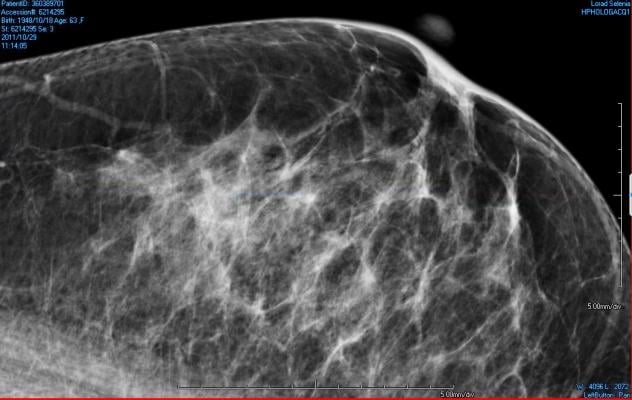
August 28, 2012 — According to the American College of Radiology (ACR), a paper by Gierach et al. in the Journal of the National Cancer Institute (which is not the National Cancer Institute's journal) says that, although they are at a small increased risk of developing breast cancer, women with dense breast tissue (a large percentage of fibrous and glandular tissues) are not at an increased risk of dying from breast cancer when compared to women with mostly fat in their breasts.
Concerns have been raised that because the ability of mammography to find cancers is somewhat reduced in women with dense breasts, they should be additionally screened with ultrasound or magnetic resonance imaging (MRI). Although it is true that supplemental screening can detect additional cancers that are not found by mammography, there are many more "false alarms" with such use compared to mammography. These include more follow-up studies and more biopsies for findings that are not cancerous. Furthermore, mammography is the only test that has been shown in randomized, controlled trials to actually save lives.
State legislatures have passed and continue to pass laws requiring radiologists to notify women that they have dense breast tissue. Some laws mention that women might want to participate in MRI and/or ultrasound screening because they have dense breasts. However, it is unknown if such screening can actually benefit them in terms of saving lives. It is important to remember that there are women who should have supplemental screening with MRI due to a high-risk status. These include women with a strong family history of breast cancer and others. Strategies other than supplemental screening can be employed to reduce breast cancer risk among high-risk women. Thus, women should speak with their doctors about their risk factors to fully explore available options.
Ultrasound and MRI were not used routinely for screening among the women who were studied in the Gierach study. Rather than requiring additional tests that may produce more false alarms, ACR says, the emphasis should be on supporting trials of MRI and ultrasound to determine whether or not using them for screening average risk women can further reduce the death rate when added to mammography.
In this study, women who were “obese” with fatty breasts were at increased risk of dying from their breast cancers. This emphasizes the fact that having fatty breast tissue does not protect a woman from developing and dying of breast cancer. This paper reinforces the fact that all women, regardless of their breast density, should participate in annual mammography screening beginning at the age of 40.
For more information: www.mammographysaveslives.org
To read a rebuttal opinion from Are You Dense Inc., click here.


 February 18, 2026
February 18, 2026 









